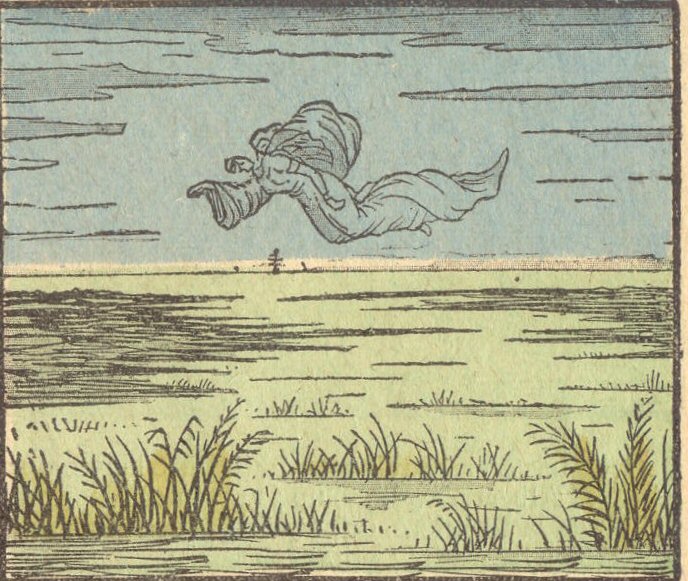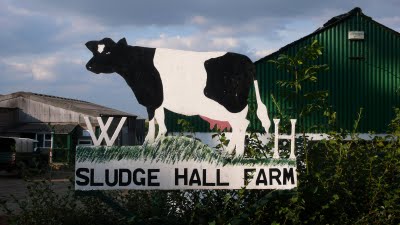“O Dobson thou art sick! Thou art sick amid the blossoms! O what shall we do? What shall we do? Let thy pamphlets be our guide!”
This was the little recitation made, oh so plaintively, by a band of hiking orphans who stumbled upon a sick and feverish Dobson in a blossom-bestrewn field one morning in 1956. Orphan hikes were a short-lived social phenomenon of the decade, one which is almost forgotten today. Inspired by the Swiss film masterpiece The Hiking Orphans, children all across the land gathered into groups and went marching off o’er hill and dale, munching toffee apples and consulting extensively detailed maps. So popular did the hikes become that many of the tots taking part were not actually orphans at all. Some became dab hands at forging death certificates, others suffocated mama and papa in their beds, or poisoned their breakfast cereal.
Dobson became a sort of patron saint of the orphan hikers following publication of his pamphlet My Parents Are Dead, But Christ!, I Adore Hiking (out of print). Because of the blasphemous abuse of the Lord’s name in the title, the pamphlet was swiftly banned and the print run pulped, but such was the demand from hiking tinies that illegal Gestetnered copies were soon circulating, often secreted in the folds of the extensively detailed maps the orphans carried in waterproof pouches strung from lanyards around their scrawny necks.
These maps were themselves a marvel, more extensively detailed than any other maps ever made. It was said that the most extensively detailed of them showed the precise alignment of chaffinches perched on the branches of an aspen you would pass if you bore left at the hedge in which a rusted farm implement had been shoved and abandoned.
Unusually, Dobson’s pamphlet included an illustration of the great man, a linocut by the hyperrealist linocutter Rex Hyper which showed the pamphleteer’s visage in breathtaking hyperrealism. So familiar was his face to the more indefatigable orphan hikers, who pored over it whenever they sat down on a log to rest, that when a band of them came upon the sick and feverish figure sprawled amid the blossoms, they instantly recognised him as Dobson. Hence their plaintive recitation. Let us parse it.
“O Dobson thou art sick!”
The orphans are making it plain that they recognise the crumpled invalid for who he is, and they recognise, too, that unlike the blossoms amid which he languishes, he is far from blooming. We might criticise them for not being more specific in their diagnosis of his ague, but ought to remember that they are mere tots, and orphaned tots at that, except for the one called Vincenzo, who is a fraudulent orphan, having used his pocket money to purchase a counterfeit newspaper cutting claiming his ma and pa perished in an avalanche.
“Thou art sick amid the blossoms!”
By repeating their declaration of the pamphleteer’s medical condition, the orphans reinforce its seriousness. This is no fugitive swoon nor spasm, they are saying, nor is Dobson lying there with his limbs splayed out because he has simply tripped upon a clump. And having driven home the point, they go on to place it in a geographical location – “amid the blossoms”. If an air ambulance is coptering in the vicinity, equipped with fantastic sound detection technology calibrated to pick up piping orphan voices, they have pitched their recitation superbly. But of course, in 1956 such air ambulances were rare, and rarer still those with fantastic sound detection technology calibrated to pick up piping orphan voices. And the chances of one hovering in range of the blossom-bestrewn field in which Dobson lies crumpled are so remote as to be not worth a fig. Tiny they may be, but the orphans know this, and thus the despair of the next line.
“O what shall we do?”
We may be brave and doughty hikers, they say, we may be free from our often repressed and oppressive parents, God rest their souls, except for Vincenzo’s, obviously, yet we are still but fragile and vulnerable tinies, and faced with this dramatic medical emergency we are beflummoxed and in some cases about to burst into tears.
“What shall we do?”
The repetition here is a pleasing echo of the repetition of “thou art sick” in the opening lines. It also commands our attention. The orphan hikers are not larking about. They are confronting, probably for the first time in their lives, a mortal dilemma. Toughened as they are by their hikes, well able to ford streams and negotiate bramble patches and vault dry stone walls and run screaming from flocks of savage angry swans, they are not so tough that they can cope with the sight of a sick and feverish pamphleteer amid the blossoms. Well, Vincenzo can, because he is, let’s say, an interesting little chap. The way in which his voice drops out of the recitation for this pair of lines lends an added harmonic jouissance, if one is listening with due care.
“Let thy pamphlets be our guide!”
Vincenzo’s voice returns for this triumphant ending. There is renewed hope. Medically ignorant and lacking such kit as bandages and tablets and proprietary nerve tonics, the orphans have one invaluable resource – the stricken pamphleteer’s own pamphlets! For all of them, their imaginations sparked by Dobson’s illegal pamphlet on hiking, have each acquired their own little collection of his works, which they carry with them wherever they hike. They realise that by taking all their Dobson pamphlets out of their pouches and combing through the texts, they are bound to alight upon a passage absolutely pertinent to the situation. As the pamphleteer himself continues to groan amid the blossoms, the orphans end their recitation on this note of optimism.
So there we have the words in context. What is curious is that, for as long as the orphan hiking fad continued thereafter, roughly until the winter of 1958, the recitation became a sort of generic chant, along the lines of the seven dwarves’ * “Hi ho, hi ho, it’s off to work we go”. Having been cured and then recuperated in a clinic a few yards away from the blossom-bestrewn field, Dobson was as hale and sprightly as ever, a fortnight after the orphans stumbled upon him, and yet they carried on chanting their recitation as they hiked hither and yon, from the outskirts of Pointy Town to the Terrifying Grim Black Mountainous Horror Of Gaar, and even further afield, to places beyond imagining. And as our little band crossed paths with other hiking orphans, their chant was picked up, until all across the land, from Blister Lane to the Big Wet Sea, every hiking orphan knew the words by heart, and chanted and hummed and howled them as they hiked.
* NOTE : See here for important seven dwarves information.




